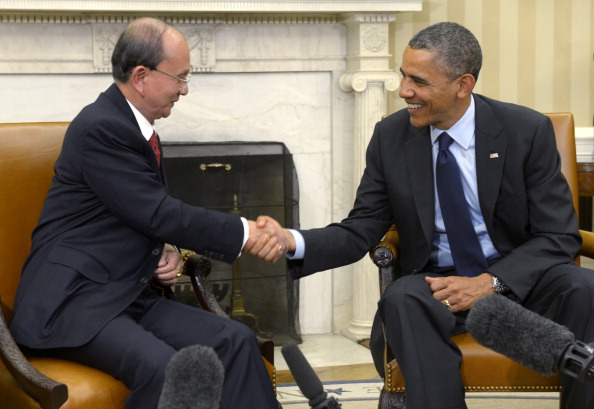
President Obama welcomed Myanmar President Thein Sein to the White House this week, hailing what he called “steady progress” being made on economic and political reforms. President Obama also reminded Myanmar’s leader that many challenges remain to be addressed, including ethnic strife, rampant corruption, and the continued detention of political prisoners.
The warm White House reception, combined with Senate Minority Leader Mitch McConnell’s call for the suspension of sanctions on imports from Myanmar, gave President Thein Sein a big boost.
Did he deserve it? Amnesty International does not bemoan high-level engagement with the Burmese government. To be sure, President Thein Sein has taken a number of steps, including the release of many political prisoners, long called for by human rights activists inside and outside Myanmar. During his visit to Washington, he also spoke compellingly about the need for economic development, peace, inclusive government, and stability in Myanmar.
But make no mistake. There is still enormous work to be done in Myanmar to address continuing human rights violations and build the rule of law, transparency, and accountability. This is not a “mission accomplished” moment for either President Thein Sein or the Obama Administration’s Myanmar policy.
Largely absent at either end of Pennsylvania Avenue this week was adequate scrutiny of the growing anti-Muslim violence against Myanmar’s Rohingya population. The Rohingya are subject to a host of discriminatory practices, but neither the government nor Myanmar’s opposition political parties have denounced this longstanding discrimination.
The government’s failure to respect the basic dignity of the Rohingya – even to officially acknowledge their existence – or to punish those responsible for their persecution threatens to undermine all that President Thein Sein says he wants to accomplish. The parliament should immediately move to amend or repeal Myanmar’s 1982 Citizenship Law so the Rohingya community is no longer labeled stateless. Over the longer term, the country must find ways to establish justice and accountability for widespread and systematic human rights abuses, especially against ethnic minorities.
As for the Obama administration, there is clearly a strategic dimension to its outreach to Myanmar. But that motivation must not be allowed to trump a commitment to human rights and rule of law. Myanmar will not be much of a strategic partner if it continues to violate the human rights of its people.
Finally, as Myanmar opens its doors for commerce and trade, U.S. companies that plan to do business in Myanmar have an ethical obligation to abide by high human rights and labor standards. It’s incumbent upon those who seek economic opportunities in Myanmar to go in with their eyes wide open and to focus on transparency as a guiding principle for any investment. The Burmese economy has been dominated by the country’s military junta, and businesses must vet their partners with extra due diligence.
This week’s dialogue generated some good will. Now it is time for good deeds.
